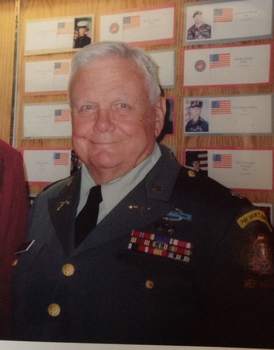Retired Lieutenant Colonel Robert P. Kingsbury, of Laconia, was laid to rest with military honors in the New Hampshire Veteran’s Cemetery, in Boscawen, on Sept. 10, 2013.
Remembering Retired Lt. Colonel Robert Kingsbury
Friday, September 27, 2013
By REP. JEANINE NOTTER
Special to the Merrimack Journal
Retired Lt. Colonel Robert P. Kingsbury, of Laconia, was laid to rest with military honors in the New Hampshire Veteran’s Cemetery, in Boscawen, on Sept. 10.
He passed away Sept. 7, at the age of 87.
He served in the 162nd NH State Legislature from 2010-12. I would like to tell you a little about the distinguished veteran who I knew.
It must have been late August 2006 when I got an invitation in the mail to an event celebrating Constitution Day. “Constitution Day celebration!” I exclaimed to myself. “Awesome! I love New Hampshire!”
I didn’t know a single soul at the start of that event, but I made new friends that day, including the representative from Freemont, Dan Itse, a now former representative from Merrimack, Peyton Hinkle, and a gentleman with a quilt on his Army uniform. Another friend I made that day was a cable talk show host from Windham, Bill McNally. From Mr. McNally, I learned that that Army veteran was Lt. Col. Bob Kingsbury, who was in Patton’s Third Army in World War II. It was an honor for me to meet him. My father was in Patton’s Third Army, too.
One month later, I was hosting my own cable talk show. One of my first guests was the sergeant who blew the wall on the beach at Normandy, the late Noel Dube, of Pepperell, Mass. God rest his soul.
Meanwhile, Colonel Kingsbury sent me a two-disc documentary titled “Patton’s Ghost Corps.” He is featured several times on Disc 2. When I had the colonel on my show, he called me, “Miss Jeanine.” His war stories were prudent for family viewing, but after the taping he gave me more details about the terrible things he saw in WWII.
Colonel Kingsbury was a Libertarian who ran many times for state representative. Once he joined the Republican Party, he won the election. He sat in front of me, in the second row of Section 3. He was hard-of-hearing, and often passed hand-written notes to those around him … along with his pen … so we could write back.
He served with me on the committee of State and Federal Relations and Veterans Affairs. The representative from Londonderry, Al Baldasaro, was our chairman. Sometimes it appeared that Rep. Kingsbury was napping during committee. There was never any snoring, but his eyes were closed and his face looked relaxed. But then he would shoot his hand up to ask a question.
So, he wasn’t sleeping. He was concentrating.
My favorite memory was the time he addressed someone who was testifying, with “Thank you, Mr. Witness.”
My friend, Bob, was known to me as Colonel, Representative and then as the Honorable Kingsbury. At his memorial, I learned that at his church he was known as “Brother Kingsbury.” He was a respected and cherished member of his church, and to other groups as well.
Camp Constitution Press published, “First Scout for General Patton,” the WWII memoirs of Pvt. Robert Kingsbury. A distant cousin of the current majority leader of the 163rd New Hampshire State Legislature gave me a copy.
As lead rifleman, there were never Americans in front of Pvt. Kingsbury, only behind him. Among other things, he wrote about the bravest men he’s ever met, the ones who didn’t make it, and a scoundrel or two. The deprivation of our soldiers was something he could never forget. They were often ill-equipped, freezing and always very hungry.
I liked the chapter describing the various rations. The better rations never seemed to make it to the front lines and the “C” rations were frozen solid during the winter. With no permission to light fires to defrost them, they were useless to our troops.
As for the “D” rations, he pondered the existence of Hell. He surmised that if there is there is a Hell, then surely it must be a place where the diet is nothing but D bars for all eternity.
He received a Purple Heart, a Combat Infantry Badge and a Bronze Star, but his main memory of combat was, “essentially, complete physical exhaustion.”
Staying active in the Army Reserves is how he got promoted to a lieutenant colonel.
He lived a full life and was a well-read man. Having donated his entire library to the John Birch Society, his collection of books filled a van. A mutual friend allowed me to look over a small portion of his books.
I knew we shared a love of history, but I didn’t know that he was also interested in deep-sea shipwreck discoveries, or that he, too, read the memoirs of Cardinal Minzenty, who was once a prisoner of the communists. I took both of those books home with me as well as “Patton’s Third Army.”
After helping to liberate the concentration camps in Europe, my father was haunted by what he saw. He was never eager to share his experiences with us. I remember having a long conversation with Colonel Kingsbury about Patton’s Third Army. He didn’t know my dad, but I feel that, in a way, I could almost hear my own father talking to me through this fellow veteran of WWII.
The Patton book is full of page markers. I’m wondering if the marked pages document events that my late friend personally experienced.
I know that Bob Kingsbury is in a better place now, at peace, and not a single D ration in sight.
He certainly must have heard the words, “Well done good and faithful servant.”
May his memory be eternal.
Thank you.
Jeanine Notter represents Merrimack in the New Hampshire House of Representatives.

